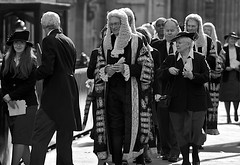Law of privacy vs. confidentiality in the nineteenth century
By Kristopher A. Nelson
in
February 2011
700 words / 3 min.
Tweet
Share
According to Richards and Solove the “right to privacy” as we now understand it actually grew out of an earlier recognition of the right to confidentiality in certain situations. Warren and Brandeis then took this original principle of confidentiality and shifted it to focus on a newly developed right to privacy.
Please note that this post is from 2011. Evaluate with care and in light of later events.
 Neil Richards and Daniel Solove, in “Privacy’s Other Path: Recovering the Law of Confidentiality” (96 Geo. L.J. 124) write:
Neil Richards and Daniel Solove, in “Privacy’s Other Path: Recovering the Law of Confidentiality” (96 Geo. L.J. 124) write:
The familiar legend of privacy law holds that Samuel Warren and Louis Brandeis “invented” the right to privacy in 1890, and that William Prosser aided its development by recognizing four privacy torts in 1960. In this Article, Professors Richards and Solove contend that Warren, Brandeis, and Prosser did not invent privacy law, [but] took it down a new path. Well before 1890, a considerable body of Anglo-American law protected confidentiality, which safeguards the information people share with others. Warren, Brandeis, and later Prosser turned away from the law of confidentiality to create a new conception of privacy based on the individual’s “inviolate personality.”
According to Richards and Solove, then, the “right to privacy” as we now understand it actually grew out of an earlier recognition of the right to confidentiality in certain situations. Warren and Brandeis then took this original principle of confidentiality, embodied in common-law decisions such as the English case of Prince Albert v. Strange (1849), and shifted it to focus on a newly developed right to privacy. Their goal? To protect individuals from a perceived new threat to their reputations and self-ownership by the growth of a new combination of technologies: photographs and new, faster printing presses of the booming newspaper industry. Essentially, the technologies that enable People magazine today galvanized Warren and Brandeis to enunciate a “right to privacy.” They produced their groundbreaking article not because of the threat of unwarranted government searches, or even the potential for telegraph operators to reveal confidential business information entrusted to them by customers, but rather because of the new potential for mass-market gossip.
The earlier–and still existing, especially in the United Kingdom, which never adopted Warren and Brandeis’ positions–right to confidentiality, on the other hand, focused on relationships: “Rather than protecting the information we hide away in secrecy,” write Richards and Solove, “confidentiality protects the information we share with others based upon our expectations of trust and reliance in relationships” (p. 125).
In short, if one intends to look at how what we call “privacy” today was perceived by Americans in the nineteenth century, one needs to begin by looking at confidentiality, not privacy as the cornerstone of such an investigation. The concern was not so much with what was secret, but rather what was shared via trust relationships. Basically, given the much smaller size and power of police agencies in the nineteenth century, most Americans were less concerned with law enforcement intrusion than with competitors and gossips. If they were concerned with government intrusion, it was in the context of protecting the home against invasion.
The second concern is exactly what Warren and Brandeis picked up on, while the first has been dealt with in American law by a patchwork of remedies, from trade secrets to copyright to “unjust enrichment,” but never developed quite as fully as in English law once Warren and Brandeis sent American jurisprudence down the path of “privacy = protection from gossip.”
Even postal mail, long considered sacrosanct from meddling by either governments or individuals, was primarily protected by postal regulations and morality. It was not until 1878 that the Supreme Court, in Ex parte Jackson, finally extended Fourth Amendment protections from papers in a person’s home to papers in transit through the mails. That this happened in the late 1800s is no surprise; this was also the beginning of the modern administrative state and the modern business monopoly. New technologies had finally forced the law to take steps to catch up.
Related articles
- Stepping stone to Internet privacy: the telegraph (inpropriapersona.com)
- The telegraph and business invasions of privacy (inpropriapersona.com)
- Extending the Fourth Amendment beyond the home: Ex parte Jackson (1878) (inpropriapersona.com)
